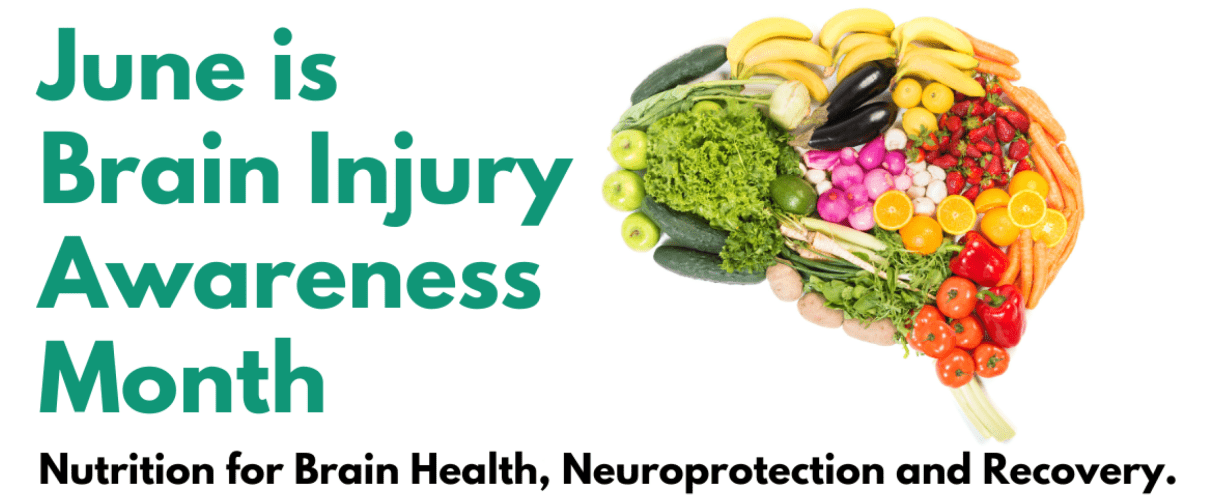Brain Health June 2023
Nutrition for Brain Health, Neuroprotection and Recovery
by Cheryl Nickurak RD Registered Dietitian, Nutritionist
June 2023 is Brain Health and Brain Injury Awareness Month. That is a big topic!
A common type of concussion is repetitive sub-concussion injury from blasts to head or body in sport, work or play. For diagnosis, see your medical doctor. For physical and mental care, see experienced physiologists, Occupational Therapists, Physical Therapists, Psychologists, Social Workers.
Let’s focus on nutrition for neuroprotection and recovery of concussion in Adults. Here is some help.
1. Good hydration: Aim to drink 30 ml/kg of pourable fluids through the day. Look for clear to pale yellow urine. Some vitamin will make urine darker. Gi a day without vitamins to check urine color.
2. Small, easy meals more often: breads, crackers, nut butters, yogurt. Smoothies, soups, stews with 2-3 food groups each meal or snack https://food-guide.canada.ca. Reduce effort and nausea that can occur with not food in empty GI. Access food easily Order ahead, get delivery or ask friends pick up your groceries. Aim for Colorful vegetables 4-6 a day Dark green, orange, red vegetables and fruits: red, purple, blue. Eat extra with meals and snacks. Soups, smoothies, milk, meal replacement.
3. Omega-3: Look for DHA, DPA and EPA rich foods to meet needs of 100-3000 to max 4000 mg a day for adults. Aim for 2000mg DHA a day.
Sources: Salmon 1200-1600 mg DHA and EPA per 3oz cooked. Tuna 170 mg, Sardines 600-1000 mg, Herring 940mg. Maybe some seaweed. Some plants have ALA Omega-3 slow conversion: Walnuts 2 whole, Ground flax seeds, 1 tsp each is 1000 mg, Soy ½ cup. Chia and pumpkin seeds are good sources as well. Great for many nutrients and fibre and don’t really help neuroprotection though.
4. Vitamin D3 tempers the immune system, which helps to prevent over-stimulation/activation, and it plays a big role in calming inflammation.
Unfortunately, there is a lack of studies, both animals and humans, to support the use of vitamin D in the treatment of concussion, but we know Canadians are either deficient or borderline deficient in this nutrient. Given its role in neurotransmitter function, immune function and anti-inflammatory mechanisms, ensuring your brain is well stocked on this vitamin is just good common sense
Vitamin D may also help to reduce risk and manage depression that can accompany concussion. Because there are very few natural food sources, get a good supplement to raise blood levels.
Food sources: milk, fatty fish like sardines, salmon, mackerel, trout, herring, eggs, cod liver oil, liver
Supplement: 1000 IU a day from April to Sept 2000-4000 IU from October to March, which depends on serum level and an MD may write a lab order.
5. Polyphenols
Plants several hundreds of different types of polyphenols – beyond blueberries or green tea.
These potent antioxidants reduce inflammation. They can get into the brain cell’s hub, the nucleus, and positively influence gene activity, interacting with the brain cells’ DNA and influencing brain cell communication; both within cells and between cells. critical steps in neuron survival.
Polyphenols can protect the brain’s blood vessels and protect against neurodegenerative disease and so are “neuroprotective”. Many foods also have prebiotic functional fibre for healthy guts.
Food sources: most plant foods: such as berries, apples, broccoli, cherries, dark chocolate, green tea, olive or avocado oil, onions
6. Curcumin from Turmeric.
Pair your turmeric with black pepper. Add this to curries, soups, smoothies. Aim for 500 mg twice daily for protection
7. What to limit:
Food preservatives, alcohol, refined sugars, saturated and trans fats.
Stay safe!
For more information contact Cheryl Nickurak, RD cnickurak@trileisure.com
Older Post
Vitamin A, Eh!
Newer Post
